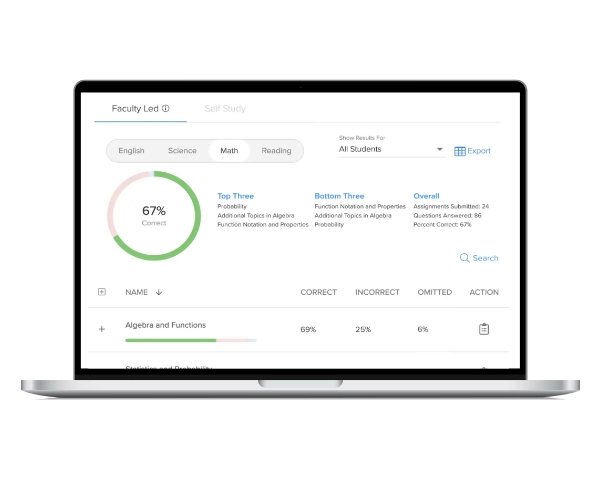It’s common knowledge in the world of education that, just as a football coach must come up with a rigorous game plan to prepare their team for the Super Bowl, teachers must seriously plan for exam readiness in the weeks leading up to a summative test. This time of content review must include spiraling through every course topic, working through a massive number of practice questions, and doing everything needed to prepare students for test day.
AP® Calculus teachers are meticulous with their plans for test prep, too, because they know that AP Calculus exams are not easy. The College Board® released a score distribution report1 for the 2022 AP exams, and in it, they reported that just 55.7% of students who took the AP Calculus AB test passed with a score of 3 or higher.
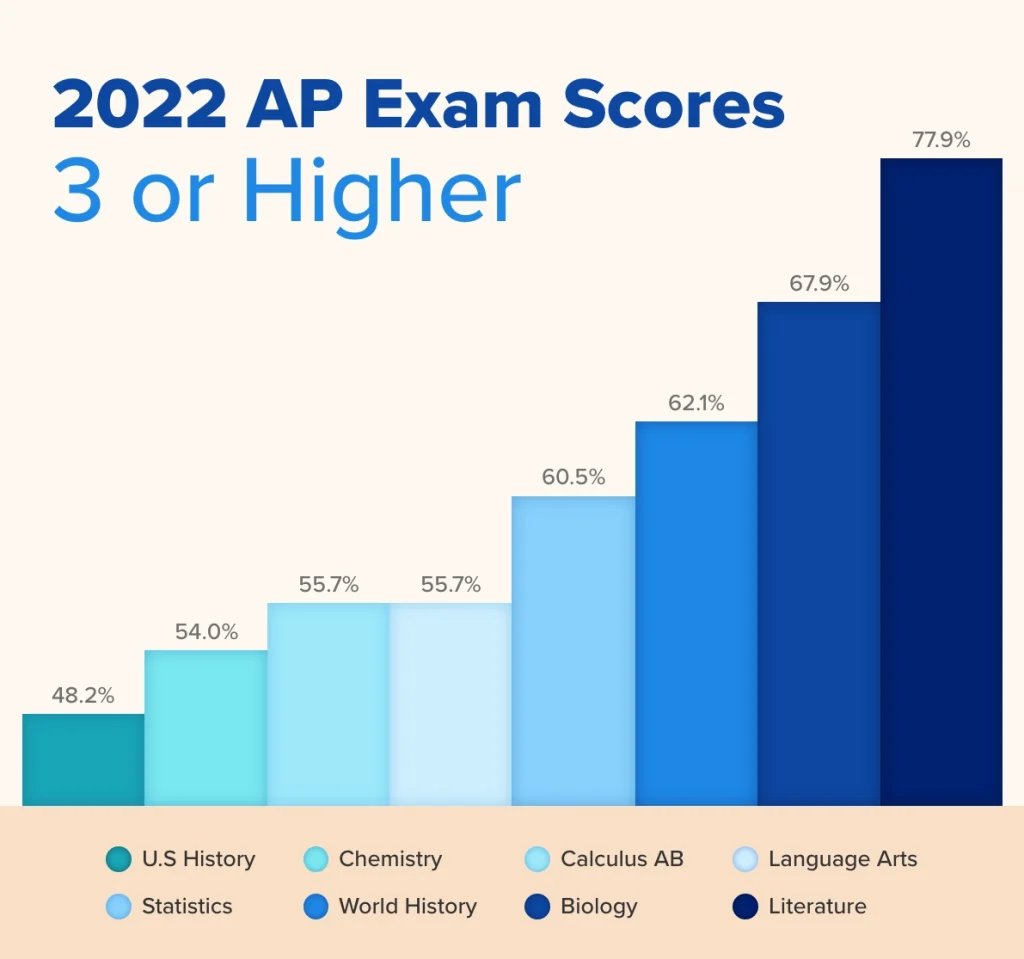
Student Score Distributions on AP exams (2022)
AP Calculus teachers want to give their students every opportunity to earn a passing score on the exam, and in order to do so, they have to carefully plan for an incredibly rigorous summative review. To make that a little easier, we’ve provided five tips for last-minute AP Calculus test preparation that can fit into any content review.
Tip 1: “Chunk” Curriculum into Smaller, Doable Parts
The purpose of planning out a few weeks of preparation before the AP Calculus test is so that teachers can spiral through key concepts for each of the course units, reviewing the material so students will remember it on test day. The problem with covering an entire course-worth of content in just a few weeks leading up to the exam is that there isn’t a lot of time to review a ton of material. Studies over the past several years, however, show that breaking study topics into smaller “bite-sized” sections is a more effective way to review for a summative exam. This strategy is called “chunking.”
The Educational Psychology Review did a study2 that looked at how breaking up information into smaller pieces could help students learn it better. The study found that, as a result of informational chunking, students felt a greater sense of confidence about the learning topics. Rather than covering an entire AP Calculus unit or a large, foundational concept in just one class, educators can instead work on smaller parts of the unit or concept, one at a time, until students have covered all of the key content needed for the test.
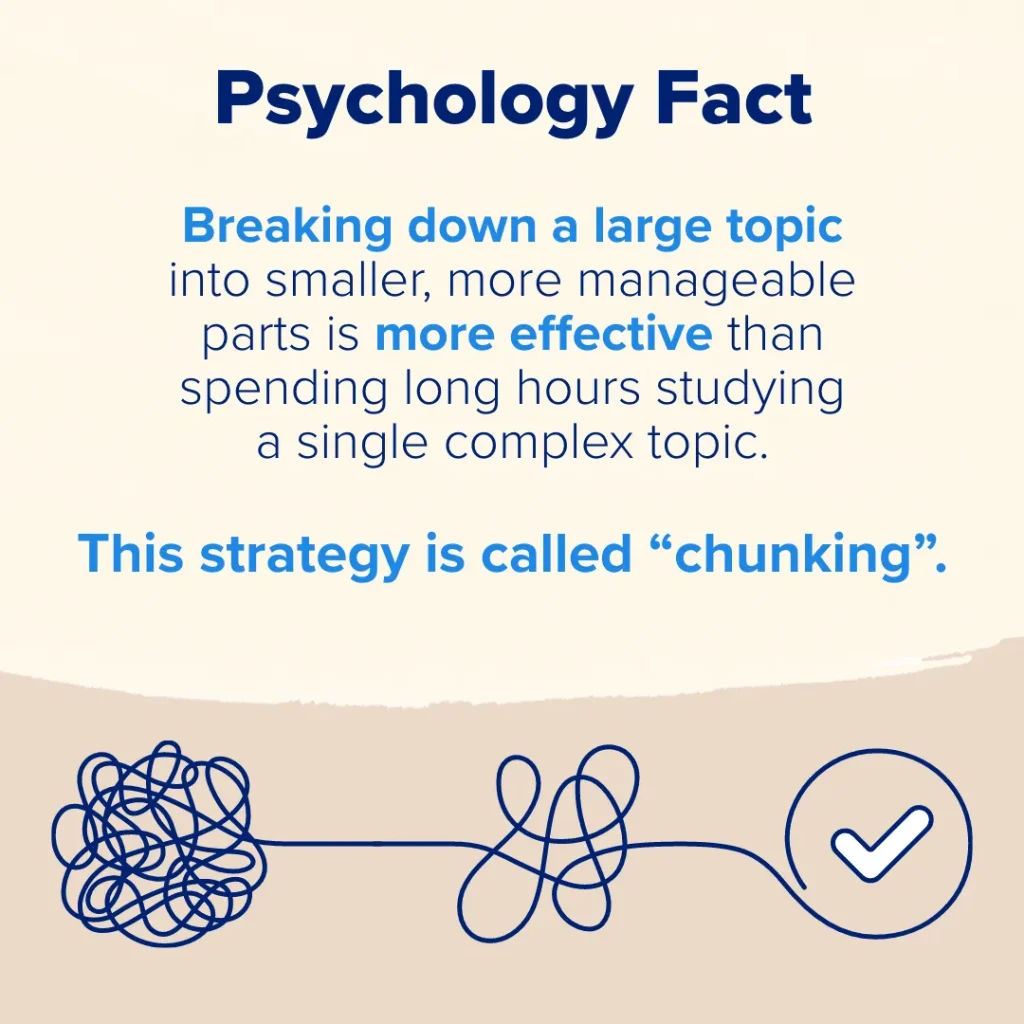
Journal of Educational Psychology Review
“Interleaving,” or reviewing multiple topics that are related at once, is another tactic AP Calculus teachers can use when preparing their students for the exam. Research shows that when teachers mix up the topics they teach, students learn to tell the difference between topics that are similar and can better apply their knowledge.2 If AP Calc teachers use chunking and interleaving to help their students prepare, their students will inevitably feel ready and confident on test day.
Our Choice for an AP Calculus Exam Review Guide: Calc Medic
Calc Medic’s AP Exam Review is our choice for an excellent review guide AP Calculus teachers can use as a tool for their summative course review.
Why We Chose It:
- Covers all the topics that are tested on the AP Calculus exam, including differential and integral calculus, limits, series, and applications of calculus.
- Includes interactive practice questions that simulate the types of questions students will encounter on the actual exam.
- Is available in a variety of formats, including online access, printable PDFs, and audio/video lessons.
- Is created by experienced AP Calculus teachers who have a deep understanding of the exam and what it takes to succeed.
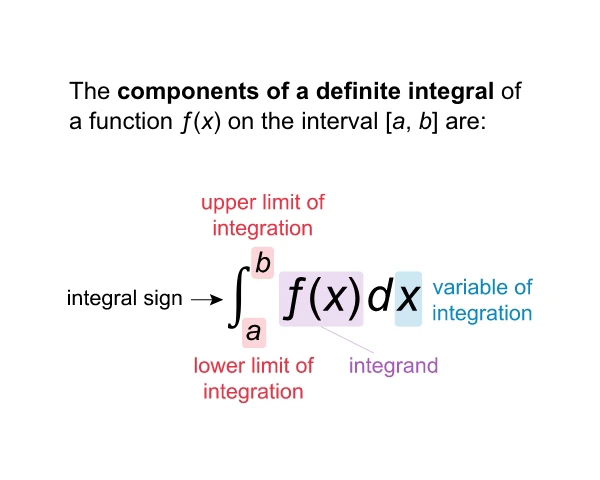
Tip 2: Practice with Released Exam Questions
Having students practice with released exams is one of the easiest ways AP Calculus instructors can support their students in getting ready for the test. According to research from the University of Nebraska-Lincoln3, test prep questions that replicated those found on the real exam raised scores by an average of 15%. In comparison, studying with questions that did not replicate those on the real test only increased test scores by 6%. Clearly, nothing can come as close to the questions students will see on test day as the ones on past AP Calculus exams.
Our Choice for Released Exam Questions: The College Board Secure Released Exams
The College Board is our top choice for a resource for released exams since they are the only source from which you can download actual released AP exams. AP teachers can access these full-length, free assessments for use in class, although students do not have access to them. These secure, recently released exams are also available in AP Classroom, both in the AP Question Bank and with other recently released questions.4 AP Calculus teachers can find out more about these released tests in the AP Classroom User Guides.
Why We Chose It:
- Are authentic AP Calculus questions that have been used on previous exams.
- Are directly relevant to the current AP Calculus exam, as they are created by the same organization that develops and administers the test.
- Provides a large number of past exam questions for both AP Calculus AB and BC courses.
- Questions are easily accessible online through the College Board’s website, and can be downloaded and printed for offline use.
Tip 3: Multiple-Choice Practice Makes Perfect
It goes without saying that practicing with multiple-choice questions is an essential part of getting ready for the AP Calculus exam. While spiraling through review topics, AP Calculus teachers should try to have their students complete at least two revisited multiple-choice questions each day. Multiple-choice exit tickets or bellringers can help students review key ideas that might be covered on the test.
By answering multiple-choice questions, students can practice how to use test-taking strategies for the AP Calculus test. By doing a variety of multiple-choice problems, students can get in the habit of using annotations, paying attention to context clues, and getting rid of answers that are obviously wrong. This habit will help them complete the test quickly and accurately. Students who practice multiple-choice questions might also get better at managing their time and get used to the pace of the test.
Our Choice for Multiple-Choice Practice: UWorld
The go-to multiple-choice practice resource is UWorld’s Learning Tools for AP Courses. It’s a fantastic way to include multiple-choice questions in last-minute AP Calculus test preparation strategies and support instruction all year.
With UWorld’s multiple-choice questions, students receive high-quality explanatory feedback. Adaptive learning technology changes each lesson based on how well the student understands it and gives them individualized practice. Students can use it throughout the year to review what they’ve learned, figure out what they’re good at and what they need help with, and build their knowledge and skills for the AP Calculus exam. Additionally, it offers a quick way for students to review concepts and practice multiple-choice questions during the final weeks of test review.
Why We Chose It:
- Gives students immediate feedback, along with a breakdown of the right and wrong answers. This feedback provides students with detailed explanations for AP Calculus questions, allowing them to understand the underlying concepts and improve their problem-solving skills.
- With hundreds of multiple-choice practice questions, it provides thorough coverage of all the topics covered on the AP Calculus exam.
- Practice questions are timed, which helps students get ready for the AP Calculus exam’s time restrictions and enables teachers to gauge their students’ capacity to finish the exam in the allotted amount of time.
- Allows for the customization of practice sessions, enabling teachers to choose particular topics and question types for their students to practice. This allows teachers to target their review to the areas where their students need the most help and ensure that they are well-prepared for the exam.
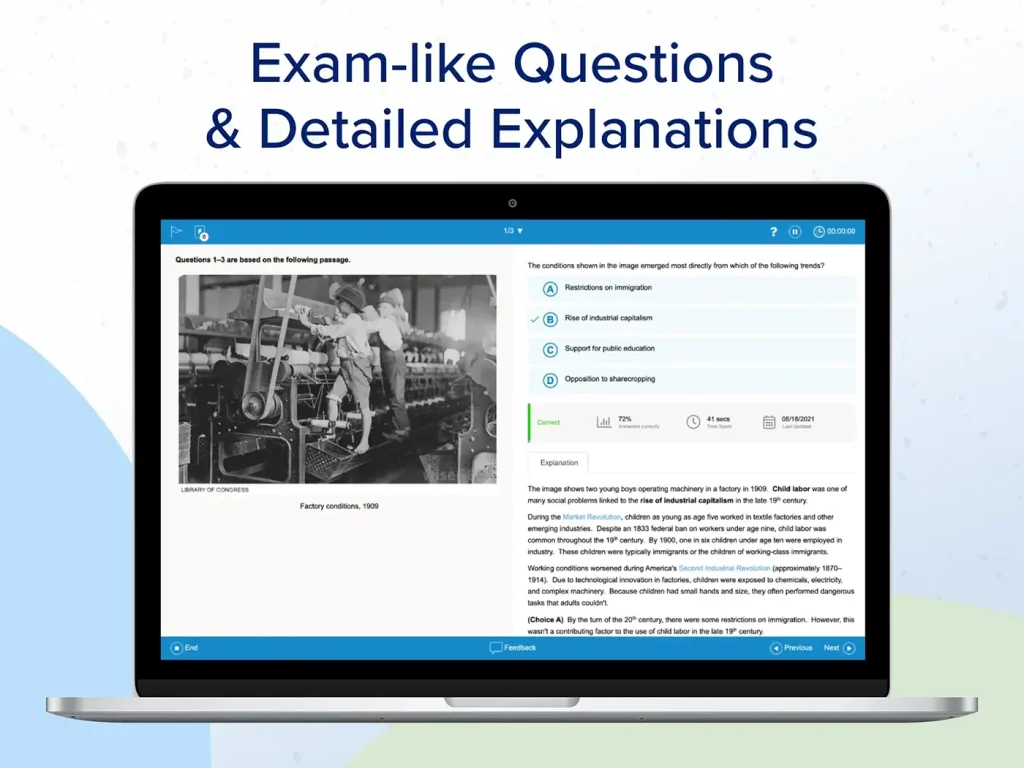
Tip 4: Greater Understanding with Justifications – Studying for FRQs
Understanding the value of understanding is one of the biggest differences between education today and education a few decades ago. To truly learn something, teachers must ensure that students comprehend why something is, rather than just providing the solution. Giving students plenty of opportunities to justify their answer selections is therefore crucial when reviewing for the AP Calculus test. In addition to helping students get accustomed to FRQs for the test, practicing free-response questions and having them explain their reasoning in a written free-response can help students understand and remember the material. A study that was published in the Journal of Computer-Assisted Learning5 found that students who had to explain why they answered questions the way they did knew more about the subject than those who just had to give answers. Adding written explanations to the learning process can help a student understand and remember the material better.
In the limited time they have to review for the AP Calculus exam, teachers can assist their students in strengthening their understanding of spiraled topics by having them complete FRQs and explain their responses. Additionally, teachers can help their students succeed on the AP Calculus exam by providing them with online examples of excellent free-response essays written by other students. They can also collaborate to generate ideas for FRQs while using sample questions.
Our Choice for Additional FRQ Practice: Master Math Mentor
For more FRQ practice questions, we recommend the Calculus Free Response Database from Master Math Mentor. It makes a great FRQ resource in addition to the released questions from the College Board.
Why We Chose It:
- Helps students simulate the timing of the actual AP Calculus exam. This is particularly important for free-response questions, which require students to write out their answers in a limited amount of time.
- Contains a large number of free response questions, giving teachers ample opportunities to incorporate them into their test review.
- FRQs are organized by difficulty level, ranging from easy to hard.
- Each question comes with a detailed solution that explains the steps required to arrive at the correct answer.
- Allows users to search for questions based on topic, year, or difficulty level, making it easy to find practice questions that are relevant to specific areas of study or skill levels.
Tip 5: Repetition with Flashcards
Repetition is a great way to ensure that content is retained, especially when going over previous course material and reviewing important vocabulary. Flashcards allow students to actively learn while they practice information retrieval, which improves their long-term memory. According to the Central Penn College Learning Center, “Flashcards help students to engage in active recall or a process wherein students actively engage in learning by stimulating our memories and creating lasting connections to the material.”6
Teachers need to go over a wide range of mathematical concepts and important vocabulary words when getting their students ready for the AP Calculus exam. While reviewing these concepts in class, students can stay engaged and motivated by participating in flashcard-based activities. Consistent flashcard-based reviews in AP Calculus classes can help students retain and recall crucial course material, whether they have students study flashcards independently or include them in group review activities.
Our Recommendation for AP Calculus Flashcards: UWorld
Our top pick for an AP Calculus flashcard resource is UWorld’s flashcards feature. UWorld’s flashcards feature is a flexible and useful way for students to review and strengthen their AP Calculus knowledge. They can make their own decks and focus on specific topics. The intuitive interface and flexibility of the flashcard feature make it a valuable study tool for any student looking to succeed on the AP Calculus exam.
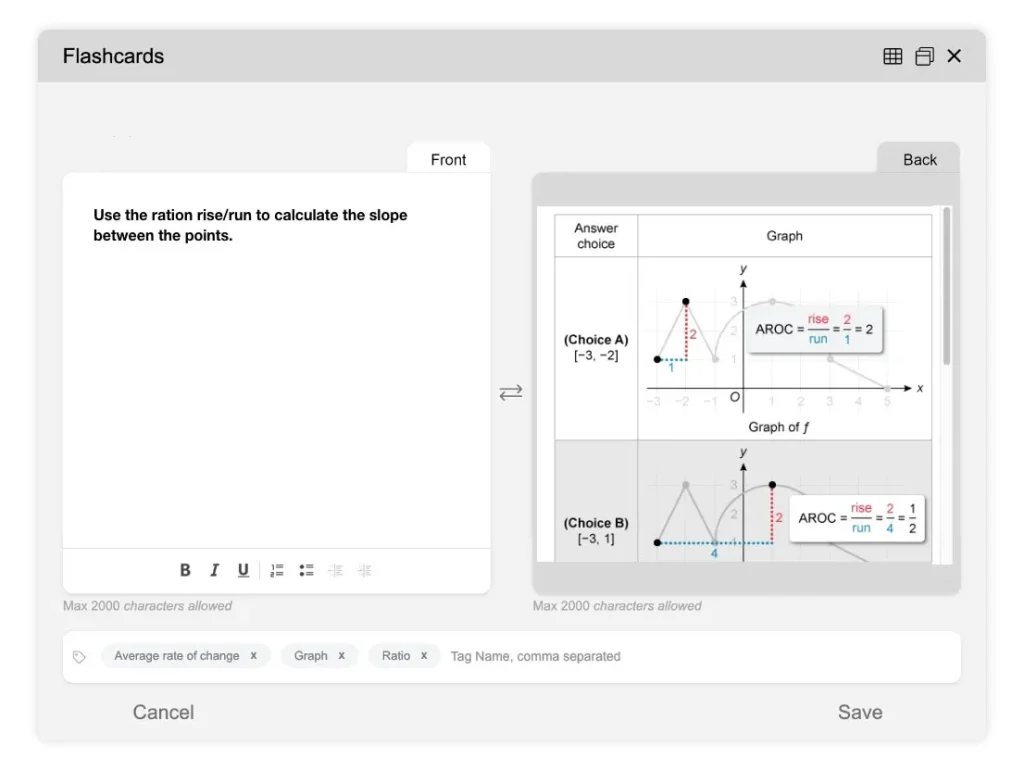
Additionally, teachers can have their students use paper flashcards for a variety of review activities. Here are our recommendations for how to effectively incorporate them into your AP Calculus exam prep.
Focus on Learning Content Over Memorization:
To increase your understanding of the subject matter overall, try to make connections between ideas rather than just memorizing facts.
Make a Flashcards Deck:
Making your own flashcards allows you to remember information better as it forces you to engage with the material and puts the content in your own words.
Combine Text and Pictures on Your Flashcards:
Including text as well as pictures on your flashcards helps your brain make connections between the visual and linguistic representations of the material, which can aid in retention and recall.
Tie Flashcards Into Fun Review Activities:
Including games or other fun activities into flashcard review can make studying more engaging and enjoyable, which can lead to better retention and a more positive attitude towards learning.
Focus on Learning Content Over Memorization:
To increase your understanding of the subject matter overall, try to make connections between ideas rather than just memorizing facts.
Make a Flashcards Deck:
Making your own flashcards allows you to remember information better as it forces you to engage with the material and puts the content in your own words.
Combine Text and Pictures on Your Flashcards:
Including text as well as pictures on your flashcards helps your brain make connections between the visual and linguistic representations of the material, which can aid in retention and recall.
Tie Flashcards Into Fun Review Activities:
Including games or other fun activities into flashcard review can make studying more engaging and enjoyable, which can lead to better retention and a more positive attitude towards learning.
Bonus Tip: Prepare Students with Test Day Reminders
This final piece of advice may seem less like an exam review idea and more like general test-taking advice, but it’s important to remember to go over what students need to do and bring with them on the day of the assessment. Every year, students forget to bring a pencil and a fully charged calculator, fail to turn off their phones, or arrive late for their AP exams. However, according to a study by the College Board7, students who were on time and had all the materials they needed for an AP exam performed 20 points better on average than those who were late or had forgotten their supplies. Spend some time going over a list of all the preparations your students must make before the AP Calculus test as well as the items they must prepare and bring on test day.
Checklist of Reminders for AP Calculus Students
The Day Before the AP Calculus Exam:
Prepare everything you’ll need for the test
Don’t cram for the test
Eat well and drink plenty of water
Unwind and practice stress-relieving techniques
Review test-taking strategies
Verify the exam’s start time and location again
Set several alarms to make sure you wake up on time
Pack everything you’ll need, including an ID with a current photo
Have a strategy for getting to the exam site
The Day of the AP Calculus Exam:
Bring a pen with dark blue or black ink
Bring a valid government-issued photo ID
Bring the AP student packet with your AP number label and demographic sheet
Bring your exam e-ticket or confirmation of registration
Bring a watch to keep an eye on the time
Bring a permitted calculator, fully-charged
Bring a snack and water, which must be left on the ground throughout the test and only touched during breaks
Key Takeaways
There is no question that the final month or so before the AP Calculus exam is a crucial period for teachers who want to give their students the best content review and test preparation possible. The five suggestions in this article can help AP Calculus instructors give their students more test-taking confidence and improve readiness.
Learn more about how we support AP educators who strive to make a difference in the lives of their students with our Learning Tools for AP Courses.
References
- Student Score Distributions* AP exams – May 2022. (n.d.). Retrieved March 22, 2023, from https://apcentral.collegeboard.org/media/pdf/ap-score-distributions-by-subject-2022.pdf
- Rohrer, D. (2012, July 28). Interleaving helps students distinguish among similar concepts – educational psychology review. SpringerLink. Retrieved March 21, 2023, from https://link.springer.com/article/10.1007/s10648-012-9201-3
- The effects of age and professional expertise on … – Wiley Online Library. (n.d.). Retrieved March 22, 2023, from https://onlinelibrary.wiley.com/doi/abs/10.1002/acp.1467
- Formative assessment. AP For All. (n.d.). Retrieved March 29, 2023, from https://apforallnyc.com/formative-assessment/
- Let me explain! the effects of writing and … – Wiley Online Library. (n.d.). Retrieved March 22, 2023, from https://onlinelibrary.wiley.com/doi/10.1111/jcal.12608
- Libguides: Learning Center – Study Skills: Flashcards. Flashcards – Learning Center – Study Skills – LibGuides at Central Penn College. (n.d.). Retrieved March 22, 2023, from https://guides.centralpenn.edu/c.php?g=695569&p=4999857
- Source: College Board. (2021). AP Exam Score Distributions. Retrieved from https://reports.collegeboard.org/media/pdf/2021-ap-student-score-distributions_1.pdf

